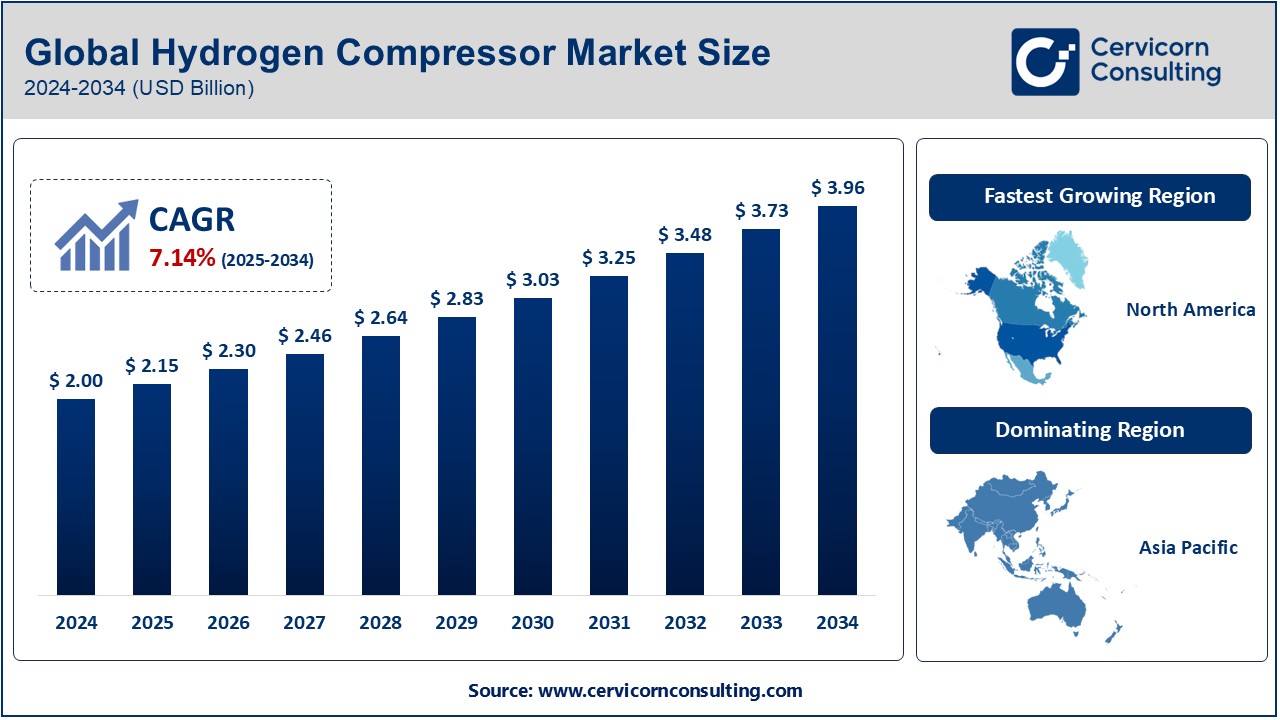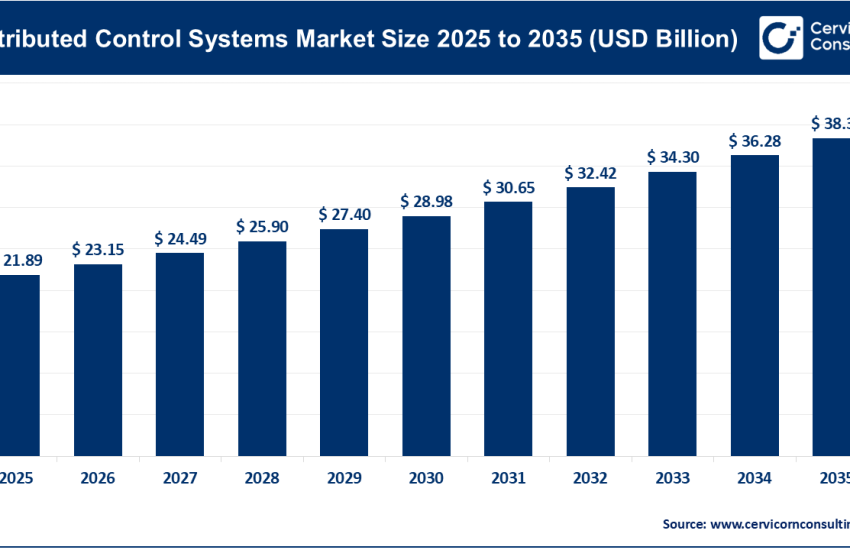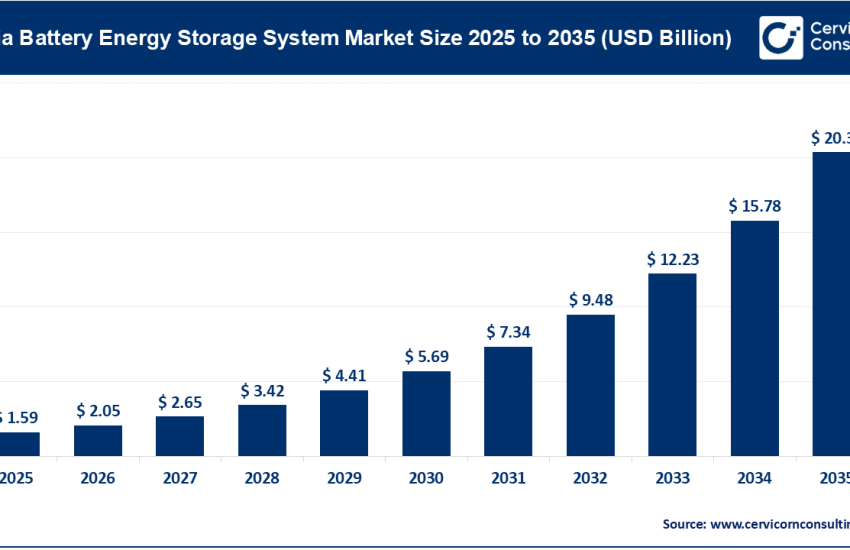Hydrogen Compressor Market Growth, Trends, Top Companies, and Global Insights (2025–2034)
Hydrogen Compressor Market Growth
The global hydrogen compressor market was worth USD 2 billion in 2024 and is anticipated to expand to around USD 3.96 billion by 2034, registering a compound annual growth rate (CAGR) of 7.14% from 2025 to 2034.
The hydrogen compressor market is poised for robust growth due to a combination of factors. Increasing investments in green hydrogen production, rising adoption of fuel cell electric vehicles (FCEVs), government incentives promoting hydrogen infrastructure, and the global drive for decarbonization significantly contribute to market expansion. Technological advancements in compressor design, growing demand from industries like oil & gas, chemicals, and power generation, and strategic collaborations among key market players further propel market growth. Additionally, the increasing need for energy storage solutions and the expansion of hydrogen refueling stations globally accelerate the demand for efficient hydrogen compression systems.
What is the Hydrogen Compressor Market?
The hydrogen compressor market comprises companies and technologies involved in the design, production, and distribution of devices used to compress hydrogen gas. These compressors are essential for various applications such as hydrogen production, storage, transportation, and fuel cell operations. They enable efficient storage and transport by increasing hydrogen gas pressure, thus reducing its volume and facilitating its integration into energy systems, fueling stations, and industrial processes. The market spans several sectors, including energy, chemical manufacturing, mobility, and industrial applications, reflecting its critical role in the transition toward a hydrogen-based economy.
Why is the Hydrogen Compressor Market Important?
Hydrogen compressors are pivotal in supporting the global shift to renewable energy and decarbonization. They facilitate hydrogen storage and transportation, ensuring safe and efficient delivery for industrial applications and hydrogen fuel cell vehicles. As countries strive to reduce carbon emissions and adopt clean energy alternatives, hydrogen emerges as a promising solution. Compressors enable the hydrogen supply chain, impacting industries like automotive, energy, and manufacturing. Their importance is amplified by increasing investments in green hydrogen production, supportive government policies, and expanding hydrogen infrastructure worldwide. Consequently, hydrogen compressors are integral to advancing the hydrogen economy and achieving global sustainability goals.
Get a Free Sample: https://www.cervicornconsulting.com/sample/2478
Hydrogen Compressor Market Top Companies
Hitachi Ltd.
- Specialization: Industrial machinery and components, including hydrogen compressors.
- Key Focus Areas: Energy solutions, industrial systems, and infrastructure development.
- Notable Features: Advanced engineering capabilities, energy-efficient compressor technologies.
- 2024 Revenue (approx.): $80 billion (total company revenue).
- Market Share (approx.): Significant share in industrial machinery and energy sectors.
- Global Presence: Strong presence in Asia-Pacific, North America, and Europe.
Burckhardt Compression Holding AG
- Specialization: Gas compression solutions for industrial gases and energy sectors.
- Key Focus Areas: Hydrogen mobility, energy storage, and chemical industries.
- Notable Features: Oil-free compressors, high-pressure solutions.
- 2024 Revenue (approx.): $750 million.
- Market Share (approx.): Leading position in the hydrogen compressor segment.
- Global Presence: Europe, Asia-Pacific, North America.
IDEX CORPORATION
- Specialization: Fluidics systems and specialty engineered products, including compressors.
- Key Focus Areas: Industrial, energy, and chemical processing sectors.
- Notable Features: Precision engineering, innovative design.
- 2024 Revenue (approx.): $3.2 billion.
- Market Share (approx.): Moderate share in industrial compression technologies.
- Global Presence: North America, Europe, Asia.
HAUG Sauer Kompressoren AG
- Specialization: Oil-free and gas-tight piston compressors.
- Key Focus Areas: Renewable energy, hydrogen mobility, and medical technology.
- Notable Features: Oil-free, hermetically sealed compressors.
- 2024 Revenue (approx.): $100 million.
- Market Share (approx.): Niche leader in oil-free hydrogen compressors.
- Global Presence: Europe, Asia-Pacific.
Chart Industries, Inc. (Howden Group)
- Specialization: Cryogenic and compression technologies.
- Key Focus Areas: Hydrogen infrastructure, LNG, and industrial gases.
- Notable Features: High-pressure compressors, integrated hydrogen solutions.
- 2024 Revenue (approx.): $3.4 billion.
- Market Share (approx.): Significant player in hydrogen infrastructure.
- Global Presence: North America, Europe, Asia-Pacific.
Leading Trends and Their Impact
- Technological Advancements: Innovations in oil-free and high-pressure hydrogen compressors are enhancing efficiency and reliability, reducing maintenance costs, and improving energy consumption.
- Green Hydrogen Expansion: Increasing investments in green hydrogen production drive demand for hydrogen compressors used in production and storage.
- Hydrogen Mobility Growth: Expansion of hydrogen fuel cell vehicle infrastructure boosts compressor demand for refueling stations.
- Strategic Collaborations: Partnerships between energy companies and compressor manufacturers accelerate technology development and market penetration.
- Government Support: Policies promoting hydrogen adoption, such as subsidies and infrastructure investments, significantly impact market growth.
Successful Examples of the Hydrogen Compressor Market Worldwide
- Japan’s Hydrogen Society: Japan has implemented large-scale hydrogen infrastructure projects, including hydrogen refueling stations equipped with advanced compressors.
- Germany’s H2 Mobility Initiative: Germany’s extensive hydrogen refueling network uses state-of-the-art compression systems to support FCEV adoption.
- California’s Hydrogen Highway: California leads the U.S. with numerous hydrogen refueling stations powered by efficient hydrogen compression technology.
- Australia’s Green Hydrogen Projects: Australia has invested heavily in hydrogen production and infrastructure, incorporating cutting-edge compression solutions.
Regional Analysis: Government Initiatives and Policies Shaping the Market
North America
- United States: The U.S. government has launched the Hydrogen Energy Earthshot initiative, aiming to reduce hydrogen production costs, driving compressor demand.
- Canada: Investment in hydrogen hubs and clean energy policies supports market growth.
Europe
- Germany: The National Hydrogen Strategy promotes hydrogen infrastructure, encouraging compressor market expansion.
- France: France’s hydrogen roadmap involves substantial investments in production and distribution, increasing compressor demand.
Asia-Pacific
- Japan: Government-led initiatives for hydrogen energy adoption and fuel cell vehicle infrastructure drive the compressor market.
- China: Massive investments in hydrogen production and transportation infrastructure accelerate market development.
Middle East & Africa
- Saudi Arabia: NEOM’s green hydrogen project stimulates the demand for hydrogen compressors.
- United Arab Emirates: Investment in clean energy projects, including hydrogen, supports compressor market growth.
Latin America
- Chile: Leading green hydrogen initiatives in Latin America create opportunities for compressor technology deployment.
- Brazil: Emerging hydrogen infrastructure investments drive market potential.
To Get Detailed Overview, Contact Us: https://www.cervicornconsulting.com/contact-us
Read Report: Europe Green Hydrogen Market Growth, Trends & Key Players by 2034



